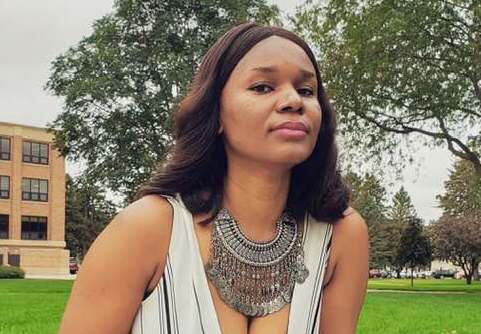
UKAMAKA OLISAKWE
There once was a time when girls did not sleep at night.
Our girl stays awake, too. In the middle of the night she stands by her baby’s cot. She rests a finger by his nostrils. She checks the rise and fall of his chest. She pulls the blanket under his arms. She stands for hours watching the curve of his face, the swirl of hair by his ears, how plump his arms are. Outside her window the world is hidden under a blanket of darkness. Frogs croak from open gutters. Crickets chirp. No human voice is heard, not even the sound of passing cars. She likes it this way, how the world falls away and it is just her and her baby and the clean smell of unperturbed night air.
In the morning, her eyes are swollen, her mind is slow. But she prepares his bath, washes and swaddles him in fineries, feeds and sings for him. She sings the song of the old, the one she learned from her mother, about the motherhen who protects her chicks from aggrieved hawks. She is a motherhen.
__
Her mother-in-law, Mama, arrives too early this morning, lugging two flasks filled with soups and meat and fish. Where is our wife and my grandson? Mama says from the doorway, her voice drowsy with joy and laughter.
She sways into the hallway, singing Igbo songs of praise.
Our girl appears at the door of her room, smiling. Mama, welcome, she says. Come inside. Your grandson has just woken from sleep.
Mama hugs our girl and they enter the room. She sees the baby in his cot and begins to dance. She throws out an arm, stamps her foot, shakes her waist, throws her head back and sighs at the ceiling. Chukwu, thank you, she tells the ceiling. Thank very much for this gift of a grandson. My late husband has now come back to life!
She lifts the baby from the cot and props him on one arm, and with the other, she traces his brow, the ridge of his nose, the fullness of his lips, his slightly-darker skin. She lifts him to the ceiling, says again, new wonder cracking her voice, He really is my late husband come back to life.
Our girl leans by the door, watching. A small smile plays by the side of her lips. If Mama can see through the thick of skin and the fold of bones, she will see contentment settling in our girl’s stomach, pulsing with each heartbeat. She will see peace, like fine pomade, massaging itself into our girl’s tired face.
Mama sits on the bed, still holding the baby, still smiling so widely. She checks his arms, counts his fingers and his toes. Another soulful tune escapes her lips. She checks his hairline and the top of his head.
Then her finger pauses when she feels the bump at the back of the baby’s tender scalp. And slowly, her smile thins out, worry wrinkling her brows. She lifts her eyes from the baby and shoots them at our girl, who now stands fiddling with her fingers, shifting her weight from one foot to the other.
Is anything the problem, Mama? Our girl asks, her voice so small.
His scalp is swollen, Mama says, her eyes full of questions. Did they vacuum him out of your body?
Yes, our girl stutters. I needed help with the delivery. He was getting weak. I was so tired.
Ewuuu chim! Mama cries, and clamps a palm over her mouth before the scream could carry out of the window.
Doctor says the swelling will go dow—
Get me his hat right now! Mama yells. We must cover his head. We must hide this swelling.
Why? Our girl asks. It is just a swelling. He is perfect.
No, he is not. This swelling says you are a weak woman. Your husband must never see this. Your visitors must never see this. No one must, or they will mock your husband for marrying a woman who couldn’t push out her baby by herself.
Our girl shrinks. She begins to say something but stops. She raises a hand but then puts it down. It wasn’t my fault, she says finally. Labour was too long.
But Mama is furious. Get me his hat, or have you gone deaf?
Our girl walks over to the baby’s basket and returns with a hat and hands it over. She glares at her toes. She glares at the floor. She has so much to say, fear and anger surging up her throat like a fast fist. But a weakness courses from her belly, melts her knees to rubber. She stands there in silence as always, because she knows what happens to girls who don’t know when to clamp their mouths shut.
Mama pulls the hat over the baby’s head, muttering things about weak women and community disgrace, how strong women are measured by the nature of their deliveries.
If Mama is attentive, she will see the fear and anger warring in our girl’s chest, each trying to overpower the other. But the older woman cares more about hiding this shame, this swelling. She pulls the hat down the baby’s ears. She inspects her handiwork; satisfied with the covering, she sighs and shakes her head.
The air is humid. The walls breathe damp warmth. The baby stirs and whimpers. Mama sways and sings for him and he sucks his lips and falls asleep.
Our girl’s husband enters later. He sees the hat and frowns. Why are you people covering the baby up like this? He says. The weather is too hot for this. Let the child breathe, biko.
He reaches for the hat, but Mama slaps his hand with a force that surprises even him. What do you know about babies? She tells him. Have you ever carried or suckled one? She asks. Eh, I ask you, have you ever given birth to a baby? Her voice pushes out of the window.
You are shouting, Mama, he says.
Don’t mama me, she says. Your son is barely two days old. His skull is not fully formed. You can’t expose him to unnecessary cold. And you must not treat him like he’s an adult. Do you hear me?
He mutters something—a curse, an angry retort, what what?—and stalks out.
Mama puts the baby in his cot, then straightens and passes our girl a stern look that says: Don’t take that hat off or he will discover your weakness and your own is done. And leaves.
Our girl pulls up the hat and stares at her baby’s scalp: the swelling is scant of hair, blushed tomato pink, breathing like it’s a being with its own mind. Shaken, she pulls the hat down.
Something groans deep inside her belly, rumbles, unfurls—a fear so old, one which she thought she has forgotten. It peels open, swirls inside her, spread in in swift waves all over her, stings her eyes with hot tears, floods her head with memories that carry the smells of things rotten. She knows this fear well: it was there when her mother and father died. It thickened her tongue when her aunt gave her soured food to eat, tightened her calves and her back every time she was whipped as a child. This fear crippled her knees, shackled her ankles, and yoked her wrists. It fled after she married, when her baby began to grow in her belly—a restless child who distorted the shape of her belly and filled her chest with hope that smelled like the earth after the first rainfall. But this fear is back and breathes and heaves inside her chest.
What if her husband finds out the swelling? Will he call her weak? Will he throw her out? Will he take a new wife? She was so wrapped in the joy of marrying and escaping the horrors of her past that she did not pause to learn the breadth or depth of this man she calls Husband; she does not know what he is capable of, or why he smiles that small smile whenever their neighbour walks past, the skinny supri-supri speaking woman who studies at the university nearby.
The war continues inside her belly. She is angry. She is afraid. What if he finds them out? Just, what if? She kneels by her baby’s cot and sings the old song to him.
__
All of the following day, as visitors come and leave, she keeps his hat on, even when sweat beads his brows, even when they complain that she is covering the baby too much.
In the evening, she bathes and swaddles him in new clothes. Outside her window, the sun dips. Dust and exhaust fumes hang thick in the air. Her room smells of Dettol and baby soap and powder. She slips a nipple into his small lips, winces when he latches on and suckles. Blood trickles out from the sides of his mouth; her inverted nipples have blistered and bleed each time he sucks them. Mama said the wound will heal in a week or so. But it does not matter. The blisters, the blood, the fatigue hanging heavy over her eyes after long hours of keeping guard over her son’s hat; none of these matter. Keeping the hat on, keeping guard against her husband, are all that matter.
She sings for him.
__
Her husband walks in later, sees them and smiles. He looks so beautiful, he tells her. He looks a lot like you.
She carries the baby to him. Do you want to hold him?
He shakes his head. Not yet, he says, I will break him. He is so delicate.
He flicks a finger over the baby’s cheek, traces the ridge of his nose. But when he reaches for his head, she pulls the baby away, says, No, you can’t remove it. He is still too tender.
Come on, Nneoma, he snaps. This baby is sweating. Can’t you see his brows? Can’t you feel how hot his body has become?
She shakes her head. He is fine with the heat. He is still so fragile.
He begins to speak again, his face contorting into a fierce mask, but the bell dings and he wags a finger at her. He leaves.
She returns to the bed. She holds her baby to her chest. He stirs and cries, and she pulls up her dress and plugs his mouth with her sore nipple.
Her husband appears at the door later. See, he says, my friends are here and they want to see the baby. Bring him after you have finished feeding him, and I don’t want any nonsense hat on his head when you bring him. Do you hear me?
She looks at him, at the vein bulging on his temple, and the war pounds inside her chest until fear overcomes anger and she sees the horror transmuting before her: the him she has yet to meet or never paid attention to. His eyes seem to darken, his jaws clenching. Maybe our girl is overreacting; maybe she is overthinking this. But she is far gone: old memories whirl and cloud her mind; they take new shapes, twist themselves into the horrors of time past: He becomes Uncle Ebuka, who stripped her naked and whipped and starved her. He is now Aunty Uchenna who kicked her out every time she overslept or misspoke. He is now Uncle Madu, who married her off to the first man that showed up at their doorstep.
Take the fucking hat off, Nneoma, what the fuck is wrong with you women? The husband is saying. He says other things, too. Nerves bulging in his temples. Nostrils flaring and squeezing. He will no longer tolerate the hat. He will now see her shame and weakness and everything will come tumbling down again.
She removes the hat and stares at the swelling. She croons for her baby, sways with him from side to side, hot tears leaking out of her eyes. She dabs the swelling with the base of her right wrist, and presses. The baby shivers, but still latches feverishly onto her nipple. She presses a little harder and he trembles and chumps down on the nipple, sending shocks of pain all over her body. She does not cry out. She is resolute.
What are you doing? The husband asks, tension lifting his words into a question.
He is perfect, she says, willing the swelling to disappear into the cave of his skull. Her vision is now blurry, her entire body trembles. Another dab, harder this time, and something caves in like fresh clay under her wrist. The baby gulps and goes into a violent shake.
Her husband lurches forward. God! He cries, snatching the now-quivering baby from her hands. What are you doing? What has come over you? Are you killing my son?
Now she still standing. Now she is shivering. Now she crumples to the floor as he yells for help.
I just want us to be perfect, she says, sniffing. Can’t you see? Can’t you see that we do this for you?

UKAMAKA OLISAKWE
grew up in Kano, Nigeria, and now lives in Vermont.
In 2014, she was named one of the continent’s most promising writers under the age of 40 by the UNESCO World Book Capital for the Africa39 project. In 2016, she was awarded an honorary fellowship in Writing from the International Writing Program at the University of Iowa. In 2018, she won the Vermont College of Fine Arts’ Emerging Writer Scholarship for the MFA in Writing and Publishing program.
Ukamaka, a finalist for the Miles Morland Writing Scholarship, has had her works appear in the New York Times, Granta, Longreads, The Rumpus, Catapult, Rattle, Waxwing, Jalada, Hunger Mountain, Sampsonia Way, and more.

